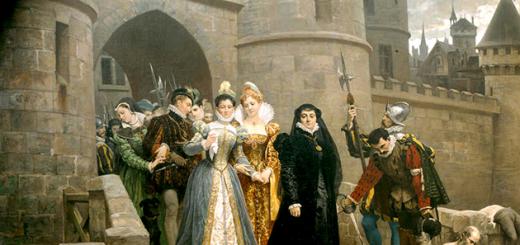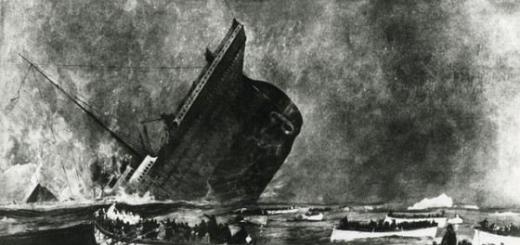"Ode on the day of the accession to the All-Russian throne of Her Majesty the Empress Empress Elisaveta Petrovna"
Lomonosov
M. V. Lomonosov is a great scientist and poet. He became a luminary of science in the 18th century. and until now his works are not forgotten. Poetry for Lomonosov is not fun, not immersion in the narrow, in his opinion, world of a private person, but patriotic, civic activity. It was the ode that became the main lyrical genre in the work of Lomonosov.
One of the most famous works of Lomonosov was the ode "On the day of the accession of Elizabeth Petrovna." Lomonosov begins it with the glorification of the world:
The joy of kings and kingdoms of the earth,
Beloved silence,
The bliss of the villages, the fence of the city,
If you are useful and red!
When she took the throne
As the Supreme gave her a crown,
I returned you to Russia
The war ended.
Sent a man to Russia
What has not been heard from the century.
Through all obstacles he lifted
Head, crowned with victories,
Russia, trample barbarism,
He lifted him up to heaven.
Describing Peter I, Lomonosov resorts to ancient mythology. The images of Mars and Neptune are used by him to denote war and the sea, which makes the ode even more solemn.
The ode "On the day of the accession of Elizabeth Petrovna" is not only a praise to the empress, but also an instruction to her. The Russia that Lomonosov wants to see is a great country, it is powerful, wise and at peace, but the main thing is that such a future is possible if Russia becomes a sacred power, the existence of which is impossible without an enlightened monarch. In a digression to the era of Peter I, Lomonosov seems to be telling Elizabeth that she should take an example from her father and continue his great deeds, in particular, promote the development of science, as her father did:
… divine sciences
Through mountains, rivers and seas,
They stretched out their hands to Russia...
Look at the high mountains
Look into your wide fields,
Where is the Volga, the Dnieper, where the Ob flows;
Wealth, hidden in them,
Science will frankly
What blooms with your generosity.
Such a huge country, the expanses of which stretch from the western plains, through the Urals and Siberia to the Far East, needs educated people. After all, only people, knowledgeable people will be able to reveal all the natural wealth of Russia:
Oh you who are waiting
Fatherland from its bowels,
And wants to see them
What calls from foreign countries!
Be of good cheer, now you are encouraged,
Show with your speech
What can own Platos
And quick-witted Newtons
Russian land to give birth.
In these lines, the poet also draws the attention of readers to the fact that the Russian land is able to give minds equal to those "which it calls from foreign countries!" He makes it clear that Russia is rich not only in natural resources, but also in capable people. People who can not only absorb science, but also sow their fruits. The natural continuation of the ode is the lines:
The sciences feed young men,
They give joy to the old,
Decorate in a happy life
In an accident, take care;
Joy in domestic difficulties
And in distant wanderings is not a hindrance.
Science is used everywhere, -
Among the nations and in the wilderness,
In the city noise and alone,
At rest they are sweet and in work.
Reading these lines, one cannot but agree with the author. A person without knowledge is not only uninteresting and boring in himself, he also leads the same life. Without knowledge, a person is not able to develop spiritually, therefore, while singing about science, the author also sings about the human soul. The glorification of man, his soul and genius is the main idea of the ode, it is the connecting thread. Science and knowledge bind not only generations, but also peoples. Knowledge is the fundamental principle of everything.
Lomonosov's ode is something more than just a literary work - it is a message. The message is not only to the Empress and contemporaries, but also to descendants. An excellent example of the fact that the descendants followed his precepts is the State University named after Mikhail Vasilyevich Lomonosov.
M. V. Lomonosov is a great scientist and poet. He became a luminary of science in the 18th century. and until now his works are not forgotten. Poetry for Lomonosov is not fun, not immersion in the narrow, in his opinion, world of a private person, but patriotic, civic activity. It was the ode that became the main lyrical genre in the work of Lomonosov.
One of the most famous works of Lomonosov was the ode "On the day of the accession of Elizabeth Petrovna." Lomonosov begins it with the glorification of the world:
The joy of kings and kingdoms of the earth,
Beloved silence,
The bliss of the villages, the fence of the city,
If you are useful and red!
When she took the throne
As the Supreme gave her a crown,
I returned you to Russia
The war ended.
Sent a man to Russia
What has not been heard from the century.
Through all obstacles he lifted
Head, crowned with victories,
Russia, trample barbarism,
He lifted him up to heaven.
Describing Peter I, Lomonosov resorts to ancient mythology. The images of Mars and Neptune are used by him to denote war and the sea, which makes the ode even more solemn.
The ode "On the day of the accession of Elizabeth Petrovna" is not only a praise to the empress, but also an instruction to her. The Russia that Lomonosov wants to see is a great country, it is powerful, wise and at peace, but the main thing is that such a future is possible if Russia becomes a sacred power, the existence of which is impossible without an enlightened monarch. In a digression to the era of Peter I, Lomonosov seems to be telling Elizabeth that she should take an example from her father and continue his great deeds, in particular, promote the development of science, as her father did:
… divine sciences
Through mountains, rivers and seas,
They stretched out their hands to Russia...
Look at the high mountains
Look into your wide fields,
Where is the Volga, the Dnieper, where the Ob flows;
Wealth, hidden in them,
Science will frankly
What blooms with your generosity.
Such a huge country, the expanses of which stretch from the western plains, through the Urals and Siberia to the Far East, needs educated people. After all, only people, knowledgeable people will be able to reveal all the natural wealth of Russia:
Oh you who are waiting
Fatherland from its bowels,
And wants to see them
What calls from foreign countries!
Be of good cheer, now you are encouraged,
Show with your speech
What can own Platos
And quick-witted Newtons
Russian land to give birth.
In these lines, the poet also draws the attention of readers to the fact that the Russian land is able to give minds equal to those "which it calls from foreign countries!" He makes it clear that Russia is rich not only in natural resources, but also in capable people. People who can not only absorb science, but also sow their fruits. The natural continuation of the ode is the lines:
The sciences feed young men,
They give joy to the old,
Decorate in a happy life
In an accident, take care;
Joy in domestic difficulties
And in distant wanderings is not a hindrance.
Science is used everywhere, -
Among the nations and in the wilderness,
In the city noise and alone,
At rest they are sweet and in work.
Reading these lines, one cannot but agree with the author. A person without knowledge is not only uninteresting and boring in himself, he also leads the same life. Without knowledge, a person is not able to develop spiritually, therefore, while singing about science, the author also sings about the human soul. The glorification of man, his soul and genius is the main idea of the ode, it is the connecting thread. Science and knowledge bind not only generations, but also peoples. Knowledge is the fundamental principle of everything.
Lomonosov's ode is something more than just a literary work - it is a message. The message is not only to the Empress and contemporaries, but also to descendants. An excellent example of the fact that the descendants followed his precepts is the State University named after Mikhail Vasilyevich Lomonosov.
- Mikhail Yuryevich Lermontov lived during the period of government reaction that followed the defeat of the Decembrist uprising. Every progressive thought was persecuted and forbidden. The Russian intelligentsia was deprived of the opportunity to openly oppose the autocracy. Writers and poets were crushed by the atmosphere of frozen life, stopped time. The authors seemed to be suffocating in the vacuum of unfreedom. In such an environment, it seemed to Lermontov that the connection between times had broken up, and the feeling of uselessness by society and the country had become constant. A life […]
- M. Yu. Lermontov lived and worked during the years of the most severe political reaction that came in Russia after the defeat of the Decembrist uprising. The loss of his mother at an early age and the very personality of the poet accompanied the aggravation in his mind of the tragic imperfection of the world. Throughout his short but fruitful life, he was alone. The lyrical hero of Lermontov is a proud, lonely person, opposed to the world and society. Lermontov's lyrics expressed a protest against the internal and external […]
- Lomonosov created spiritual odes as philosophical works. In them, the poet transcribed the Psalter, but only those psalms that are close to his feelings. At the same time, Lomonosov was attracted not by the religious content of spiritual chants, but by the opportunity to use the plots of psalms to express thoughts and feelings of a philosophical and partly personal nature. It is known that Lomonosov had to defend his views in a fierce struggle with pseudo-scientists, with religious fanatics. Therefore, two main themes develop in spiritual odes - […]
- There are many color symbols in the works of F. M. Dostoevsky. They are quite common in the novel Crime and Punishment. It is the color that helps to understand the state of mind of the characters in the work. The most common color on the pages of the novel is yellow. This is the “yellow wallpaper” in the room of Raskolnikov and other heroes. "Yellowed Katsaveyka" by Alena Ivanovna. Sonya has a “yellow ticket”. Luzhin has a ring with a yellow stone. Yellow furniture, yellow face, yellow frames, yellow sugar. The feeling of such a color […]
- The inner world of Bazarov and its external manifestations. Turgenev draws a detailed portrait of the hero at the first appearance. But strange thing! The reader almost immediately forgets individual facial features and is hardly ready to describe them in two pages. The general outline remains in the memory - the author presents the hero's face as repulsively ugly, colorless in colors and defiantly wrong in sculptural modeling. But he immediately separates facial features from their captivating expression (“Livened up with a calm smile and expressed self-confidence and […]
- Curiosity, fearlessness, an unjustified craving for adventure are the characteristics of the protagonist of the novel. Throughout the book, the author shows it to us from many different angles. First, this is the view of Maxim Maksimych, and then the notes of Pechorin himself. I cannot call the “fate” of the hero tragic, since neither the death of Bela, nor Grushnitsky, nor the sadness of Maxim Maksimych make his life more tragic. Perhaps even your own death is not much worse than all of the above. The hero is very detached from people, plays […]
- The poem "Vasily Terkin" is a truly rare book Plan: 1. Features of military literature. 2. The image of the war in the poem "Vasily Terkin". a) "Vasily Terkin" as the Bible of a front-line man. b) Terkin's character traits in Russian fighters. c) The role of the hero in raising the patriotic spirit of soldiers. 3. Evaluation of the poem by critics and the people. Over the long four years during which the war between the USSR and Nazi Germany continued, many literary works were written that rightfully entered the treasury of Russian […]
- N.V. Gogol built his comedy "The Inspector General" on the plot basis of an everyday anecdote, where, due to imposture or an accidental misunderstanding, one person is mistaken for another. This plot was of interest to A. S. Pushkin, but he himself did not use it, losing it to Gogol. Working diligently and for a long time (from 1834 to 1842) on The Inspector General, reworking and rearranging, inserting some scenes and throwing out others, the writer developed the traditional plot with remarkable skill into an integral and coherent, psychologically convincing and […]
- Tyutchev's poetry is a reflection of his inner life, his thoughts and feelings. All this created an artistic image and acquired a philosophical understanding. It is not for nothing that Tyutchev is called the singer of nature. The beauty of Russian nature from a young age entered the heart of the poet. True, Tyutchev wrote his first poems about nature back in Germany. It was there that his "Spring Thunderstorm" was born. Every time he comes to his native place, the poet presents us with wonderful poems about his homeland, creating a whole cycle of pictures of nature. So was his poem […]
- The life story of the central character of the epic novel by M. Sholokhov "The Quiet Don" by Grigory Melekhov most fully reflected the drama of the fate of the Don Cossacks. Such cruel tests fell on his lot, which a person, it would seem, is not able to endure. First the First World War, then the revolution and the fratricidal civil war, an attempt to destroy the Cossacks, the uprising and its suppression. In the difficult fate of Grigory Melekhov, the Cossack liberty and the fate of the people merged into one. A strong temper inherited from his father, […]
- "The Thunderstorm" was published in 1859 (on the eve of the revolutionary situation in Russia, in the "pre-storm" era). Its historicism lies in the conflict itself, the irreconcilable contradictions reflected in the play. She responds to the spirit of the times. "Thunderstorm" is an idyll of the "dark kingdom". Tyranny and silence are brought in it to the limit. A real heroine from the folk environment appears in the play, and it is the description of her character that is given the main attention, and the little world of the city of Kalinov and the conflict itself are described more generally. "Their life […]
- There are many exciting things in the world that you can and want to do in your free time. I have many different hobbies: drawing, computer games, music… However, most of all I like to read. Reading is not a very popular hobby these days. Many of my mom's friends complain that they can't get their child to read. I don't understand, why force? After all, there is nothing more exciting than reading. I fondly remember the books I read as a child. Adventures of Dunno and his friends, […]
- The best part of Yesenin's creativity is connected with the village. The birthplace of Sergei Yesenin was the village of Konstantinovo, Ryazan province. The middle, the heart of Russia, gave the world a wonderful poet. The ever-changing nature, the colorful local dialect of the peasants, old traditions, songs and fairy tales from the cradle entered the consciousness of the future poet. Yesenin claimed: “My lyrics are alive with one great love, love for the motherland. The feeling of the motherland is the main thing in my work.” It was Yesenin who managed to create in Russian lyrics the image of a village in the late XIX - early XX […]
- The assessment of the representatives of the intelligentsia in Bulgakov's story is far from unambiguous. Professor Preobrazhensky is a famous scientist in Europe. He is looking for means to rejuvenate the human body and has already achieved significant results. The professor is a representative of the old intelligentsia and professes the principles of morality and morality. Everyone, according to Philipp Philippovich, in this world should do their own thing: in the theater - to sing, in the hospital - to operate. Then there will be no destruction. And to achieve the material [...]
- Thirty-year-old N. S. Leskov entered the literary field in the early 60s. XIX century, when his older contemporaries had already come to great literature: Tolstoy, Dostoevsky, Turgenev, Pisemsky. Leskov is the owner of a rare artistic outlook, "he pierced the whole of Russia." He was at the same time one of the original thinkers who had his own view of the history of Russia, on the path of its movement and development. One of the peaks of the writer's artistic creativity was his famous story "Lefty". The story is being […]
- At the ball After the ball Feelings of the hero He is "very strongly" in love; admired by the girl, life, ball, beauty and elegance of the surrounding world (including interiors); notices all the details on a wave of joy and love, ready to be touched and shed tears from any trifle. Without wine - drunk - with love. He admires Varya, hopes, trembles, is happy to be chosen by her. It is light, does not feel its own body, "floats". Delight and gratitude (for a feather from a fan), "cheerful and contented", happy, "blessed", kind, "an unearthly being." WITH […]
- The talented Russian satirist of the 19th century M. E. Saltykov-Shchedrin devoted his life to writing works in which he denounced autocracy and serfdom in Russia. He, like no one else, knew the structure of the "state machine", studied the psychology of the chiefs of all ranks, the Russian bureaucracy. In order to show the vices of public administration in their entirety and depth, the writer used the grotesque technique, which he considered the most effective means of reflecting reality. The grotesque image always comes out […]
- The writer's individuality of V. Bunin is marked to a great extent by such a worldview in which a sharp, hourly "feeling of death", constant memory of it is combined with a strong thirst for life. The writer might not have confessed to what he said in his autobiographical note: "The Book of My Life" (1921), because his work itself speaks of this: "The constant consciousness or feeling of this horror / death / haunts me a little not from infancy, under this fatal sign I live all […]
- The theme of the village and the life of the nobles in their family estates was one of the main ones in the work of Bunin the prose writer. As the creator of prose works, Bunin declared himself in 1886. At the age of 16, he wrote lyric-romantic stories, in which, in addition to describing the youthful impulses of the soul, social problems were already outlined. The process of disintegration of noble nests in the work of Bunin is devoted to the story "Antonov apples" and the story "Dry land". Bunin knew the life of the Russian village well. He spent his childhood and youth on the […]
- The field of Austerlitz is very important for Prince Andrei, there was a reassessment of his values. At first, he saw happiness in fame, social activities, and career. But after Austerlitz, he "turned" to the family, he realized that it was there that true happiness could be found. And then his thoughts cleared up. He realized that Napoleon was not a hero or a genius, but simply a pitiful and cruel person. So, it seems to me, Tolstoy shows which path is true: the path of the family. Another important scene is a feat. Prince Andrei committed a heroic [...]
Let us turn to the analysis of one of the best odes of Lomonosov "On the day of the accession to the All-Russian throne of Her Majesty the Empress Empress Elizabeth Petrovna, 1747". The term "ode" (from the Greek "ωδή, which means song) was established in Russian poetry, thanks to Trediakovsky, who, in turn, borrowed it from Boileau's treatise. In the article "Discourse on the Ode", Trediakovsky described this genre as follows: "In the ode noble, important, rarely tender and pleasant matter is always and certainly described, in speeches very poetic and magnificent." addressed thematically to "noble and important matter": peace and tranquility in the country, the wise rule of an enlightened monarch, the development of domestic sciences and education, the development of new lands and the prudent use of wealth in old lands.
Lomonosov developed in practice and approved for decades to come the formal features of the genre, or, in other words, its poetics. In the ode we meet large-scale images; majestic style, raising the described pictures above the ordinary; "magnificent" poetic language, saturated with Church Slavonicisms, rhetorical figures, colorful metaphors and hyperbole. And at the same time - the classical rigor of construction, the "harmony of the verse": a seasoned iambic tetrameter, a stanza of ten lines, an inviolable scheme of flexible rhyme ababvvgddg.
Let's start the analysis of the text from the first stanza:
Joy of kings and kingdoms of the earth, Beloved silence, Bliss of villages, fences of cities, If you are useful and red! Around you the flowers are dazzling And the classes in the fields turn yellow; Treasures full of ships Dare in the sea for you; With a generous hand You pour Your wealth over the earth.
As if from a bird's eye view, the poet surveys villages, cities, earing grain fields, ships plowing the seas. They are all fanned and protected by "blissful silence" - peace and tranquility in Russia. The ode is dedicated to the glorification of Empress Elizabeth Petrovna, but even before her appearance in the ode, the poet manages to express his main and cherished idea: peace, not war, contributes to the prosperity of the country. The Empress, who enters the ode in the next stanza, turns out, according to artistic logic, to be derived from this all-encompassing peaceful silence (“His soul is quieter marshmallow”). Very interesting move! On the one hand, the poet maintains the parameters of a laudatory genre (“there can be nothing more beautiful than Elizabeth in the world”). But on the other hand, from the first lines of the work, he firmly outlined his author's position. And then the lyrical voice of the poet, and not the projection on the image of the empress, will more and more clearly lead the development of the narrative. The dominant role of the lyrical hero in the ode is Lomonosov's undoubted artistic achievement in this traditional classic genre.
Lomonosov strives to maintain the compositional norms of the genre, that is, the principle of constructing an odic poem. In the introductory part, the subject of chanting and the main idea of the work are stated (although, as we have seen, the poet reversed them). This is the thesis. The main part substantiates, proves the stated thesis about the greatness and power of the glorified object. And, finally, the conclusion (or finale) gives a look into the future, into the further prosperity and power of the glorified phenomena. The norms of classicism are rationalistic, therefore one compositional part of the work strictly and consistently follows the prescribed other.
The introductory part, or, as it is also called, the exposition, occupies twelve stanzas in this Lomonosov ode. The poet glorifies Elizabeth against the background of her predecessors on the throne strictly following one after another. In the royal portrait gallery, the father of the current ruler, Peter I, is especially highlighted. This is the poet's idol. It is clear to the reader from the detailed and highly pathos characterization of Peter that it was from him that the daughter took over the baton of great deeds.
From the fourteenth stanza, the ode enters its main part. The idea is expanding, and its artistic implementation suddenly begins to show new, non-traditional features. The lyrical pathos passes from the dynasty of rulers to the majestic image of the Fatherland, to its inexhaustible natural resources, enormous spiritual and creative possibilities:
This glory to You alone, Monarchine, belongs, Your vast power, Oh, how it thanks You! Look at the high mountains, Look at your wide fields, Where is the Volga, the Dnieper, where the Ob flows; Wealth in them is hidden Science will be frank, What blooms with Your generosity.
That's where the scope for the inspiration of the lyrical hero! The virtues of the "beautiful Elizabeth" are gradually fading into the background. The poet's thoughts are now occupied with something else. The thematic direction of the ode itself is changing. And the author himself is now not just an ode writer. He is a patriotic scientist who draws the attention of readers to the burning problems for Russia. The development of sciences will help master the riches of the North, the Siberian taiga and the Far East. Russian sailors, with the help of cartographers, discover new lands, paving the way to "unknown peoples":
There, the wet fleet's path turns white, And the sea tries to give way: Columbus of Russia through the waters Hastens to announce Your bounties to unknown peoples.
Pluto itself, the mythical owner of underground riches, is forced to yield to the developers of the minerals of the Northern and Ural (Riphean) mountains. By the way, let us recall that Lomonosov perfectly studied the mining business:
And behold Minerva strikes Into the tops of the Riphean with a spear. Silver and gold run out In all your inheritance. Pluto in the clefts is restless, That the metal from the mountains is betrayed into the hands of the Rosses Draga, Which nature has hidden there; From the brilliance of the daylight, He averts his gloomy gaze.
And yet, the main thing that will bring Russia into the ranks of world powers is, according to the poet, new generations of people: educated, enlightened, Russian youth devoted to science:
O you, whom the Fatherland expects from its bowels, And desires to see such, Which it calls from foreign countries, Oh, your days are blessed! Dare, now you are encouraged, To show by your zeal, That the Russian land can give birth to its own Platos And quick-witted Newtons. Science nourishes young men, Gives joy to the old, Decorates in a happy life, Protects in an accident; There is joy in domestic difficulties And in distant wanderings is not a hindrance, Science is used everywhere: Among the peoples and in the desert, In the city garden and alone, In sweet peace and work.
The topic of the decisive role of science and education in the development of the country was stated, as we remember, by Cantemir. Trediakovsky served science with his work and throughout his life. And now Lomonosov perpetuates this theme, puts it on a poetic pedestal. Exactly so, because the two stanzas just quoted are the culmination of the ode, its highest lyrical peak, the pinnacle of emotional animation.
But here the poet, as it were, catches on, remembering that the ode is dedicated to an official event: the annually celebrated date of the accession to the throne of the empress. The final stanza is again directly addressed to Elizabeth. This stanza is obligatory, ceremonial, and therefore, I think, not the most expressive. The poet rhymes with an effort the boring word "unstumbling" with the epithet "blessed":
To you, O Mercy Source, O Angel of our peaceful years! The Almighty is an assistant to him, Who dares with his pride, Seeing our peace, Rise up against you with war; The Builder will keep you unstumbling in all ways And your blessed life He will compare with the number of Your bounties.
Obviously not the best line! Let's try to put the question as follows: if the genre of the classic ode is an expression of certain political and state views, then in the Lomonosov ode whose views are these views to a greater extent, the empress or the poet himself? In answering this question, the third stanza is especially important. In it, Elizabeth is presented as a peacemaker who stopped all wars for the sake of peace and happiness of the Russians:
When She ascended the throne, As the Most High gave her a crown, She returned You to Russia, She put an end to the war; Having accepted you, she kissed you: - I am full of those victories, - she said, - For which blood is flowing. I delight in Ross's happiness, I do not change with their calmness For the whole West and East.
But in reality, Elizabeth was not a peacemaker at all! The militant ruler conceived new and new campaigns on the borders of the Russian state. Military battles were a heavy burden on the families of Russian working people. How little the real Elizaveta Petrovna corresponded to the ideal of the ruler of the country, which is recreated in the work! And what one had to be not just a brave, but a daring person to praise the Empress for a foreign policy opposite to that which she established with regard to military operations! With his ode, Lomonosov told Elizaveta Petrovna that Russia needs peace and does not need war. The pathos and style of the work are peacemaking, not invocative-aggressive. The stanzas become beautiful and magnificent in terms of the abundance of expressive means when the poet enters the theme of the world together with the sciences and demands that the “fiery”, that is, military, sounds be silenced:
Be silent, fiery sounds, And cease to waver the light: Here in the world, Elizabeth deigned to expand science. You impudent whirlwinds, do not dare Roar, but humbly divulge Our names are beautiful. In silence, listen, O universe: Behold, Lyra is admiring, To pronounce great names.
Lomonosov's metaphors are especially colorful. Metaphor (in Greek metaphora´ means transfer) is an artistic technique that combines different phenomena or objects into one image, transferring the properties of these different objects to each other. Because phenomena or objects are compared within the image, it receives additional emotional and semantic meanings, its boundaries are moved apart, the image becomes voluminous, bright and original. Lomonosov loved metaphors precisely for their ability to combine dissimilar details into a coherent grandiose picture, to bring to the main idea of the work. “Metaphor,” he noted in his “Rhetoric” (1748), “ideas seem much more lively and magnificent than simply.” Artistic thinking of Lomonosov was essentially, as they would say now, synthesizing.
Here is one example of Lomonosov's metaphor. The fifth stanza from the ode "On the day of the ascension ...":
In order for a word to be equal to them, The abundance of our strength is small; But we can't help singing Your praises; Your bounty encourages Our spirit and urges us to run, Like a capable wind in a swimmer's bluff Breaks through the waves, It leaves the shore with joy; Feed flies between the water depths.
Most of the space in this stanza is occupied by a complex and ornate metaphor. More often metaphors are in several words or in one sentence. Here you are amazed at the scale of the metaphorical image. To isolate it, you have to think carefully about the text. Before us is an exquisite compliment to the Empress. The poet complains that he does not have lofty words equal to the virtues of Elizabeth, and yet he decides to sing these virtues. At the same time, he feels himself like an inexperienced swimmer who ventured alone "through the ravines of the wave" to cross the "Pont" (that is, the Black Sea). The swimmer is guided and supported along the way by a "capable", that is, fair, wind. Similarly, the poetic spirit of the author is kindled and directed by the wonderful deeds of Elizabeth, her "bounties."
To communicate the grandeur and scope of thought to the ode, Lomonosov had to resort to difficult turns of speech. In his "Rhetoric" he theoretically substantiated the legitimacy of the "decoration" of the poetic style. Each phrase, obeying the high odic style, should give rise to a feeling of pomp and splendor. And here, in his opinion, even inventions are commendable: for example, such "sentences in which the subject and predicate are conjugated in some strange, unusual or miraculous way, and thus constitute something important and pleasant." G.A. Gukovsky figuratively and accurately spoke about this poet’s desire for both colorful splendor and harmonious harmony: “Lomonosov builds whole colossal verbal buildings that resemble the huge palaces of Rastrelli; his periods, by their very volume, by their very rhythm, give the impression of a gigantic upsurge of thought and pathos. The groups of words and sentences symmetrically located in them, as it were, subordinate the immense element of the present and the future to human thought and the human plan.
The splendor and magnificence of the poetic style help Lomonosov to recreate the powerful energy and colorful visualization of the paintings described. Here, for example, in the ode of 1742 is a surprisingly vivid picture of a military battle, in the center of which is a personified image of Death. From the contemplation of this image goosebumps run on the skin:
There the horses with their stormy feet Lift thick dust to the sky, There Death between the Goth regiments Runs, furious, from rank to rank, And opens its jaw to greed, And stretches out cold hands, Their proud spirit is expelled.
And what wonderful horses with "stormy legs"! In ordinary speech it is impossible to express it this way, in poetic speech it is possible. Moreover, the "stormy legs" of the horses, raising thick dust to the sky, are almost a cosmic image. Held at the same time on a very thin poetic blade. A little to the side, and everything will fall into absurdity.
Half a century later, the poet-innovator, the founder of Russian romanticism V.A. Zhukovsky, describing a special state of mind inspired by the twilight descending in rural silence, writes: "The soul is full of cool silence." He will amaze his contemporaries with an unprecedentedly bold combination of words. "Can silence be cool!" - severe critics will reproach the poet. But after all, Lomonosov was the first in Russian poetry to resort to bold combinations of words and concepts in his metaphorical style!
Mikhail Vasilyevich Lomonosov is known not only as an outstanding scientist, but also as a talented writer and poet who made a great contribution to Russian literature. One of his famous works is "Ode on the day of the accession to the All-Russian throne of Her Majesty Empress Elizabeth Petrovna in 1747." We offer a brief analysis of “Ode to the Accession of Elizabeth to the Throne” according to a plan that will help in preparing for a lesson in literature in grade 8.
Brief analysis
History of creation- The poem was written in 1747.
Theme of the poem- Glorification of the great achievements of Empress Elizabeth Petrovna.
Composition- The composition conditionally consists of three parts: in the first part the monarch is glorified, in the second - the riches and opportunities of Russia are described, in the third part laudatory words are again raised to the wise ruler.
Genre- Oh yeah.
Poetic size– Iambic tetrameter using cross, adjacent and encircling rhymes.
Metaphors – « give ... mind fruit.
epithets – « generous”, “earthly”, “great”, “deep”, “cruel”.
Comparisons – « the soul of her marshmallow is quieter", "the sight is more beautiful than paradise."
Avatars – « whirlwinds, do not dare to roar”, “Mars was afraid”.
Hyperbola – « through mountains, rivers and seas.
Slavisms – « city”, “daughter”, “vyya”, “behold”.
History of creation
"Ode on the day of the ascension ..." was written by Mikhail Vasilyevich in 1747, on the sixth anniversary of a significant event - the accession to the throne of Elizabeth Petrovna. In his work, he noted the positive aspects of the reign of the new empress, who continued the good undertakings of Peter I.
Elizabeth came to grips with the restructuring of the Academy of Sciences: she approved a new staff and a new decree, doubled the funds needed for the needs of the academy, and supported science and Russian scientists in every possible way.
In the same period, the question of Russia's possible entry into a new war was very urgent. The coalition of Austria, Holland and England offered the Russian government to take part in the war against France and the German states for the right to receive the Austrian inheritance.
In his work, Lomonosov not only glorifies Elizabeth for her desire to bring Russia to a new level in the matter of education, but also warns against entering the war, insisting on a peaceful program for the development of the state.
Subject
The central theme of the work is the glorification of the great deeds of Empress Elizabeth Petrovna, who, according to the author, chose the right course in governing the Russian state.
The main idea of the work is duty to one's Fatherland, serving which is the highest reward and honor for every person, whether it be a simple worker or a monarch.
In fact, the ode is a message addressed not only to the empress, but also to the contemporaries and descendants of the poet. He passionately dreams of the prosperity and well-being of Russia, its spiritual development, life in peacetime, without wars and hardships.
Composition
The composition of the work fully complies with the basic rules for constructing an ode and consists of three conditional parts, logically related to each other.
In the first part of the poem, the poet expresses his delight and praises the empress, her services to the fatherland. He also glorifies the past achievements of the state and its rulers, with special admiration recalls Peter I and his famous reforms. According to the author, it was from him that Elizabeth took over the baton of great deeds.
In the second part, the poet gradually departs from the personality of the ruler and focuses on the majestic image of Russia, with its endless expanses, inexhaustible natural wealth and huge creative and spiritual potential. He sees the strengthening and enrichment of the state in the development of sciences, and the future of the country - in educated, enlightened young people.
The final part of the work again glorifies the monarch for his deeds aimed at the good of the fatherland.
Genre
The work is written in the ode genre, which was Lomonosov's favorite literary genre. This is a solemn work, designed to glorify a significant person or an important event, and Mikhail Vasilyevich had no equal in the skill of writing odes.
The poetic size of the work is iambic tetrameter, also Lomonosov's favorite size. He used it with great skill, giving the poem a special solemnity, sonority and musicality.
Rhyming in this work also deserves special attention. The first four lines are characterized by cross rhymes, followed by 2 lines with adjacent rhymes, and encircling rhymes complete the poem.
means of expression
The work is distinguished by an amazing variety of artistic means, with the help of which the ode acquires a solemn, high style. Among them comparisons(“the soul of her marshmallow is quieter”, “the sight is more beautiful than paradise”), personifications("Whirlwinds, do not dare to roar", "Mars was afraid"), hyperbole("through mountains, rivers and seas"), Slavicisms(“hail”, “daughter”, “vyya”, “behold”), metaphors(“Submit ... mind fruit”).
A special place is occupied by incredibly colorful and imaginative epithets: "generous", "earthly", "great", "deep", "cruel".
Thanks to the skillful use of expressive means, the author manages to fully reveal his creative intent.
Poem Test
Analysis Rating
Average rating: 4.5. Total ratings received: 120.
M.V. Lomonosov wrote "Ode to put on the accession to the All-Russian throne of Her Majesty the Empress Empress Elisaveta Petrovna in 1747." The genre of the ode allowed him to combine lyrics and journalism within the framework of one poetic text - to the author of the question, to speak out on issues of civil, public importance. The poet admires the innumerable natural resources of the Russian state:
Where in the luxury of cool shadows
In the flock of galloping deer
Catch the cry did not disperse;
Where the hunter did not mark with a bow;
With the ax farmer's thud
Singing birds did not frighten.
The abundance of natural resources is the key to the successful development of the Russian people. The central themes of the ode are the theme of labor and the theme of science. The poet appeals to the younger generation to devote themselves to the service of science:
Be emboldened now
Show with your care
What can own Platos
And quick-witted Newtons
Russian land to give birth.
Lomonosov writes about the benefits of science for all ages. The ode creates an ideal image of a ruler who cares about the people, the spread of education, and the improvement of economic and spiritual development. The high "calm" of the ode is created by the use of Old Slavonicisms, rhetorical exclamations and questions, ancient mythology.
1) Genre originality of the work.
Ode is a solemn poem glorifying some significant person or historical event. The ode is characterized by a strict logic of presentation.
2) Features of the composition of a lyrical work. The ode has a three-part composition:
Part 1 - poetic delight, praise to the addressee, a description of his services to the fatherland.
2nd part - glorification of the past successes of the country, its rulers; a hymn to modern educational successes in the country.
3rd part - the glorification of the monarch for his deeds for the good of Russia.
3) Features of the "calm" of the ode.
The ode is written in a "high calm". This work is dedicated to the empress, the author uses, along with Russian words, Church Slavonic vocabulary: joy, use, wanderings, etc.
How can young people weaken Russia? (hard work)
What should science be for a person, according to M.V. Lomonosov? (joy, food for the mind, help in difficult situations, etc.)
The personality of G.R. Derzhavin.
Gavrila Romanovich Derzhavin was the largest representative of Russian classicism. He was born on July 3, 1743 in the family of a small Kazan nobleman. The entire fortune of the family consisted of a dozen souls of serfs. Poverty prevented G.R. Derzhavin to receive a systematic education.
Only in 1759 (at the age of 16) he was able to enter the Kazan gymnasium, but he did not study there for long either.
In 1762, Derzhavin was called up for military service. Poverty also affected here: unlike most noble youths, he was forced to start serving as a private and only in 1772 received an officer's rank. Derzhavin served in the Preobrazhensky Regiment in St. Petersburg. Together with the regiment, he participated in the palace coup that put Catherine II on the Russian throne. The young poet began to write poetry while still in the soldier's service; two notebooks of that early period of creativity have been preserved.
In 1773 G.R. Derzhavin began to publish. Gavrila Romanovich was an adherent of an enlightened monarchy, he believed in the reason and justice of the supreme ruler; sharply negative attitude to peasant uprisings and participated in the suppression of the Pugachev rebellion. Derzhavin was dismissed several times for his too decisive and bold character.
Glory came to the poet only in 1783 after the appearance of his famous ode "Felitsa", dedicated to Catherine 11. The queen, flattered by the ode, returned the poet to the service. G.R. Derzhavin reached the highest government positions: he was a senator, state treasurer, and minister of justice. But the bureaucratic career of Gavrila Romanovich did not work out. The reason for this was Derzhavin's honesty and directness. Alexander I, removing him from the post of Minister of Justice, explained his decision by the inadmissibility of such a "zealous service."
Literary fame and public service made G.R. Derzhavin is a rich man. He spent the last years of his life in prosperity and tranquility, living alternately either in St. Petersburg or on his own estate near Novgorod. The poet died in 1816.










